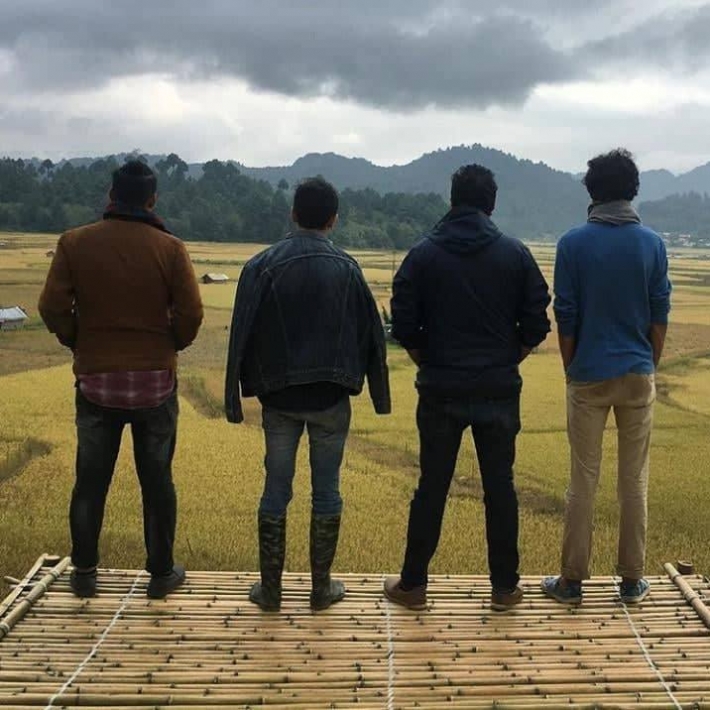
 Photo Courtesy: Gauley Bhai
Photo Courtesy: Gauley Bhai
The way forward is backward – to the roots. That is what Bangalore band Gauley Bhai, which translates to a known face of the neighbourhood, have proven with their debut album ‘Joro’. They stand above the rest of the indie musicians of the country because they had the courage to sing in their own language, not bowing to conformity.
Joro, which means fever in Nepali, is a stellar 10 track record, clocking in at about an hour. The violin is the central piece of the musical arrangement. It is played by vocalist Veechet Dhakal while his brother Anudwatt handles bass. The brothers and guitarist Siddhant Mani Chettri hail from the Himalayan town of Kalimpong, while drummer Joe Panicker is from Kozhikode.

Joe and Anudwatt play root rhythms in a very funky manner on which the guitar creates beds for the violin to weave the magic. This formula is prevalent in the whole album. The guitar tone is set in a way that it acts as an effective shadow to the violin as it evidenced on the title track. The tribal calls at the latter end of the song throws it into a dissonant, yet beautiful helter skelter.
The opener ‘Thupari Udi’ has garage rock feels which moves into a call and answer pattern between the vocals and guitar. This is found again on the album closer ‘Morau’, which is lyric heavy with two rhythmic patterns playing alternately throughout. ‘Tallo Gaonko’ is pure Nepali folk – a true reflection of their urban sound infused with ethnic musings.
Each song is a story made up of multiple sonic sub-plots and transitions are the fulcrum on which the entire record balances out its numerous sonic avatars. And the violin is the central nerve, bleeding into all. However, the transitions are used too much and at times, they are out of sync with the uniform run of the song’s length.
The most transitions occur in the instrumentation heavy ‘Ghamandi’. An angry overtone builds up gradually as an insane funk rhythm plays behind teasing guitar phrases, fading in and out of violin slides. The vocals are unusual – a variant of careless free-styling. The latter part evolves into Santana-esque vibrations while the tempo picks up smoothly to end in chaos.
Another funky song is ‘Mo Ko Lai Diu’ where claps lend a bounce which the rhythm section elevates into an energetic punch. The voice keeps singing while the soundscape falls into a lull and again goes back to the original thread.
‘Simrayo’ however takes a turn towards the trance like rhythms of Africa. The song plays like a drone over booming bass lines, gyrating grooves and layered guitar patches.

The more tender tracks on the otherwise upbeat record are ‘Sanglanga Dooby’ and ‘Bhari’. A snippet of poetry leads into the former, which has post rock elements and sparkling, clean chords, whereas the former starts with a melancholic violin. It later evolves into something similar to an Irish folk tune which resurfaces at the last transition, while the verse is cuddled by a smooth lullaby.
On ‘Nepali Ko Rela’, a mirthful bass line with equally swaying rhythms introduces the listener to Gorkhaland. The violin takes on the vaster characteristics of a slide guitar, filling out the sound, over a bed of raw, grungy guitar.
The album is an eye-opener to the possibilities of cultural crossovers. It’s high time that Indian languages take centre stage and celebrate its diversity. The resultant music will also be fresh. So one should thank Gauley Bhai for depicting the migratory character of contemporary Indian society. One of the best albums to have come out this year, Joro is contemporary world music yearning for the mountains.
Listen to Joro
Watch Gauley Bhai Live at Ziro Festival 2018
Previous Article PCRC Drop More Obscure, Introspective New Album- Bismillah PCRC Drop More Obscure, Introspective New Album- Bismillah
|
Next Article Colorblind- Post Modern Holocaust Album Review Colorblind- Post Modern Holocaust Album Review
|
This one’s for the real fans, man.




Leave a comment